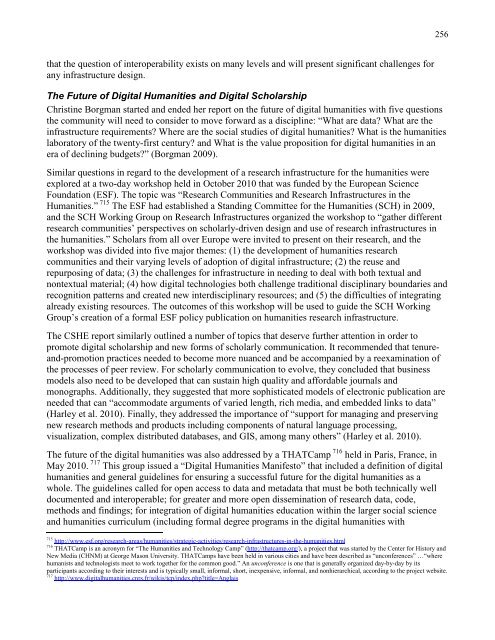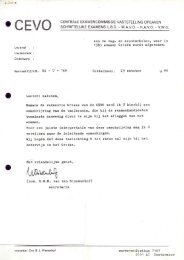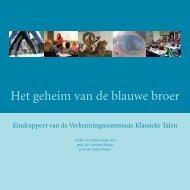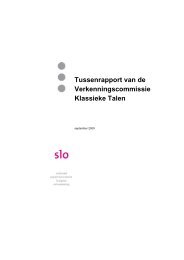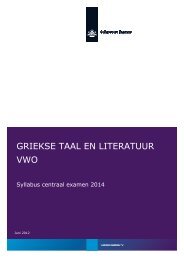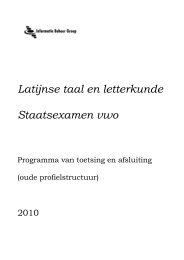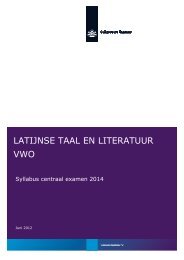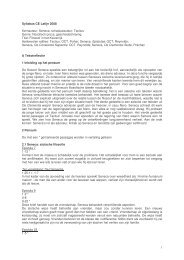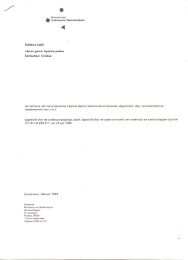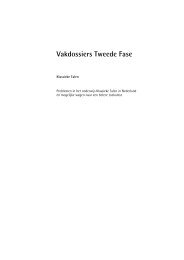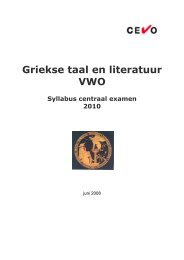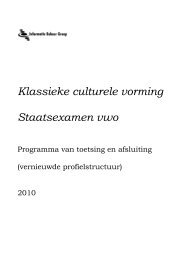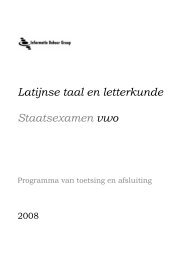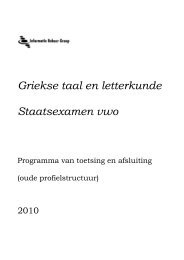Rome Wasn't Digitized in a Day - Council on Library and Information ...
Rome Wasn't Digitized in a Day - Council on Library and Information ...
Rome Wasn't Digitized in a Day - Council on Library and Information ...
You also want an ePaper? Increase the reach of your titles
YUMPU automatically turns print PDFs into web optimized ePapers that Google loves.
256<br />
that the questi<strong>on</strong> of <str<strong>on</strong>g>in</str<strong>on</strong>g>teroperability exists <strong>on</strong> many levels <strong>and</strong> will present significant challenges for<br />
any <str<strong>on</strong>g>in</str<strong>on</strong>g>frastructure design.<br />
The Future of Digital Humanities <strong>and</strong> Digital Scholarship<br />
Christ<str<strong>on</strong>g>in</str<strong>on</strong>g>e Borgman started <strong>and</strong> ended her report <strong>on</strong> the future of digital humanities with five questi<strong>on</strong>s<br />
the community will need to c<strong>on</strong>sider to move forward as a discipl<str<strong>on</strong>g>in</str<strong>on</strong>g>e: “What are data What are the<br />
<str<strong>on</strong>g>in</str<strong>on</strong>g>frastructure requirements Where are the social studies of digital humanities What is the humanities<br />
laboratory of the twenty-first century <strong>and</strong> What is the value propositi<strong>on</strong> for digital humanities <str<strong>on</strong>g>in</str<strong>on</strong>g> an<br />
era of decl<str<strong>on</strong>g>in</str<strong>on</strong>g><str<strong>on</strong>g>in</str<strong>on</strong>g>g budgets” (Borgman 2009).<br />
Similar questi<strong>on</strong>s <str<strong>on</strong>g>in</str<strong>on</strong>g> regard to the development of a research <str<strong>on</strong>g>in</str<strong>on</strong>g>frastructure for the humanities were<br />
explored at a two-day workshop held <str<strong>on</strong>g>in</str<strong>on</strong>g> October 2010 that was funded by the European Science<br />
Foundati<strong>on</strong> (ESF). The topic was “Research Communities <strong>and</strong> Research Infrastructures <str<strong>on</strong>g>in</str<strong>on</strong>g> the<br />
Humanities.” 715 The ESF had established a St<strong>and</strong><str<strong>on</strong>g>in</str<strong>on</strong>g>g Committee for the Humanities (SCH) <str<strong>on</strong>g>in</str<strong>on</strong>g> 2009,<br />
<strong>and</strong> the SCH Work<str<strong>on</strong>g>in</str<strong>on</strong>g>g Group <strong>on</strong> Research Infrastructures organized the workshop to “gather different<br />
research communities’ perspectives <strong>on</strong> scholarly-driven design <strong>and</strong> use of research <str<strong>on</strong>g>in</str<strong>on</strong>g>frastructures <str<strong>on</strong>g>in</str<strong>on</strong>g><br />
the humanities.” Scholars from all over Europe were <str<strong>on</strong>g>in</str<strong>on</strong>g>vited to present <strong>on</strong> their research, <strong>and</strong> the<br />
workshop was divided <str<strong>on</strong>g>in</str<strong>on</strong>g>to five major themes: (1) the development of humanities research<br />
communities <strong>and</strong> their vary<str<strong>on</strong>g>in</str<strong>on</strong>g>g levels of adopti<strong>on</strong> of digital <str<strong>on</strong>g>in</str<strong>on</strong>g>frastructure; (2) the reuse <strong>and</strong><br />
repurpos<str<strong>on</strong>g>in</str<strong>on</strong>g>g of data; (3) the challenges for <str<strong>on</strong>g>in</str<strong>on</strong>g>frastructure <str<strong>on</strong>g>in</str<strong>on</strong>g> need<str<strong>on</strong>g>in</str<strong>on</strong>g>g to deal with both textual <strong>and</strong><br />
n<strong>on</strong>textual material; (4) how digital technologies both challenge traditi<strong>on</strong>al discipl<str<strong>on</strong>g>in</str<strong>on</strong>g>ary boundaries <strong>and</strong><br />
recogniti<strong>on</strong> patterns <strong>and</strong> created new <str<strong>on</strong>g>in</str<strong>on</strong>g>terdiscipl<str<strong>on</strong>g>in</str<strong>on</strong>g>ary resources; <strong>and</strong> (5) the difficulties of <str<strong>on</strong>g>in</str<strong>on</strong>g>tegrat<str<strong>on</strong>g>in</str<strong>on</strong>g>g<br />
already exist<str<strong>on</strong>g>in</str<strong>on</strong>g>g resources. The outcomes of this workshop will be used to guide the SCH Work<str<strong>on</strong>g>in</str<strong>on</strong>g>g<br />
Group’s creati<strong>on</strong> of a formal ESF policy publicati<strong>on</strong> <strong>on</strong> humanities research <str<strong>on</strong>g>in</str<strong>on</strong>g>frastructure.<br />
The CSHE report similarly outl<str<strong>on</strong>g>in</str<strong>on</strong>g>ed a number of topics that deserve further attenti<strong>on</strong> <str<strong>on</strong>g>in</str<strong>on</strong>g> order to<br />
promote digital scholarship <strong>and</strong> new forms of scholarly communicati<strong>on</strong>. It recommended that tenure<strong>and</strong>-promoti<strong>on</strong><br />
practices needed to become more nuanced <strong>and</strong> be accompanied by a reexam<str<strong>on</strong>g>in</str<strong>on</strong>g>ati<strong>on</strong> of<br />
the processes of peer review. For scholarly communicati<strong>on</strong> to evolve, they c<strong>on</strong>cluded that bus<str<strong>on</strong>g>in</str<strong>on</strong>g>ess<br />
models also need to be developed that can susta<str<strong>on</strong>g>in</str<strong>on</strong>g> high quality <strong>and</strong> affordable journals <strong>and</strong><br />
m<strong>on</strong>ographs. Additi<strong>on</strong>ally, they suggested that more sophisticated models of electr<strong>on</strong>ic publicati<strong>on</strong> are<br />
needed that can “accommodate arguments of varied length, rich media, <strong>and</strong> embedded l<str<strong>on</strong>g>in</str<strong>on</strong>g>ks to data”<br />
(Harley et al. 2010). F<str<strong>on</strong>g>in</str<strong>on</strong>g>ally, they addressed the importance of “support for manag<str<strong>on</strong>g>in</str<strong>on</strong>g>g <strong>and</strong> preserv<str<strong>on</strong>g>in</str<strong>on</strong>g>g<br />
new research methods <strong>and</strong> products <str<strong>on</strong>g>in</str<strong>on</strong>g>clud<str<strong>on</strong>g>in</str<strong>on</strong>g>g comp<strong>on</strong>ents of natural language process<str<strong>on</strong>g>in</str<strong>on</strong>g>g,<br />
visualizati<strong>on</strong>, complex distributed databases, <strong>and</strong> GIS, am<strong>on</strong>g many others” (Harley et al. 2010).<br />
The future of the digital humanities was also addressed by a THATCamp 716 held <str<strong>on</strong>g>in</str<strong>on</strong>g> Paris, France, <str<strong>on</strong>g>in</str<strong>on</strong>g><br />
May 2010. 717 This group issued a “Digital Humanities Manifesto” that <str<strong>on</strong>g>in</str<strong>on</strong>g>cluded a def<str<strong>on</strong>g>in</str<strong>on</strong>g>iti<strong>on</strong> of digital<br />
humanities <strong>and</strong> general guidel<str<strong>on</strong>g>in</str<strong>on</strong>g>es for ensur<str<strong>on</strong>g>in</str<strong>on</strong>g>g a successful future for the digital humanities as a<br />
whole. The guidel<str<strong>on</strong>g>in</str<strong>on</strong>g>es called for open access to data <strong>and</strong> metadata that must be both technically well<br />
documented <strong>and</strong> <str<strong>on</strong>g>in</str<strong>on</strong>g>teroperable; for greater <strong>and</strong> more open dissem<str<strong>on</strong>g>in</str<strong>on</strong>g>ati<strong>on</strong> of research data, code,<br />
methods <strong>and</strong> f<str<strong>on</strong>g>in</str<strong>on</strong>g>d<str<strong>on</strong>g>in</str<strong>on</strong>g>gs; for <str<strong>on</strong>g>in</str<strong>on</strong>g>tegrati<strong>on</strong> of digital humanities educati<strong>on</strong> with<str<strong>on</strong>g>in</str<strong>on</strong>g> the larger social science<br />
<strong>and</strong> humanities curriculum (<str<strong>on</strong>g>in</str<strong>on</strong>g>clud<str<strong>on</strong>g>in</str<strong>on</strong>g>g formal degree programs <str<strong>on</strong>g>in</str<strong>on</strong>g> the digital humanities with<br />
715 http://www.esf.org/research-areas/humanities/strategic-activities/research-<str<strong>on</strong>g>in</str<strong>on</strong>g>frastructures-<str<strong>on</strong>g>in</str<strong>on</strong>g>-the-humanities.html<br />
716 THATCamp is an acr<strong>on</strong>ym for “The Humanities <strong>and</strong> Technology Camp” (http://thatcamp.org/), a project that was started by the Center for History <strong>and</strong><br />
New Media (CHNM) at George Mas<strong>on</strong> University. THATCamps have been held <str<strong>on</strong>g>in</str<strong>on</strong>g> various cities <strong>and</strong> have been described as “unc<strong>on</strong>ferences” …“where<br />
humanists <strong>and</strong> technologists meet to work together for the comm<strong>on</strong> good.” An unc<strong>on</strong>ference is <strong>on</strong>e that is generally organized day-by-day by its<br />
participants accord<str<strong>on</strong>g>in</str<strong>on</strong>g>g to their <str<strong>on</strong>g>in</str<strong>on</strong>g>terests <strong>and</strong> is typically small, <str<strong>on</strong>g>in</str<strong>on</strong>g>formal, short, <str<strong>on</strong>g>in</str<strong>on</strong>g>expensive, <str<strong>on</strong>g>in</str<strong>on</strong>g>formal, <strong>and</strong> n<strong>on</strong>hierarchical, accord<str<strong>on</strong>g>in</str<strong>on</strong>g>g to the project website.<br />
717 http://www.digitalhumanities.cnrs.fr/wikis/tcp/<str<strong>on</strong>g>in</str<strong>on</strong>g>dex.phptitle=Anglais


